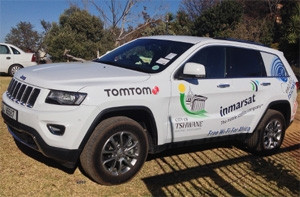
Project Isizwe has taken its aim to enable WiFi connectivity across SA on the road, with the launch of WiFi Winston - the non-profit organisation's (NPO's) satellite-enabled car allowing communities to connect within a 50m radius of the vehicle.
The project was unveiled last week, with the car beginning its journey to KwaZulu-Natal, via Swaziland. Project Isizwe head Alan Knott-Craig Jr says connectivity is driven by mobile satellite company Inmarsat.
The car will only remain in towns for one day at a time, according to Knott-Craig. "We aim for [speeds of] 1Mbps, but it depends on congestion in area," he says. "Ideally, we'd like Winston to be a two-year project, starting with SA, but ultimately roaming through every country in Africa."
The vehicle is scheduled to travel across SA's nine provinces in nine weeks, according to Project Isizwe, and the initiative is sponsored by Neotel, Avis, the City of Tshwane, TomTom, Shoprite, and vehicle branding company Graffiti.
The NPO says the project is aimed at raising awareness about wireless connectivity in rural areas across SA and encouraging public officials to introduce WiFi to communities at grassroots levels.
Independent telecoms researcher Samantha Perry says while showcasing connectivity is commendable, it is difficult for Project Isizwe to demonstrate the technology's benefits if SA's rural communities have a low penetration of WiFi-capable devices.
However, notes Perry, "If Winston can show people what the Internet is and how it can benefit them then it will have a big impact.
"Ground up pressure on the private and public sectors to provide affordable connectivity will only happen once people understand why they need connectivity and how much benefit they will get from being able to access the World Wide Web," she adds.
Long-term influence
Mark Walker, director of insights and vertical industries for the Middle East and Africa at the International Data Corporation, says the project needs to be relevant to rural communities in order to have the greatest impact.
Walker says the initiative could be a catalyst for more permanent solutions, which benefit communities in the long-run. "If it could somehow be used to deliver government services, that would have an impact," he says.
"Perhaps such an initiative could learn from satellite-enabled ATMs in rural areas." Walker says the mobile solutions presented by banks served the need for communities to access cash, in a move which went beyond a marketing drive.
Share